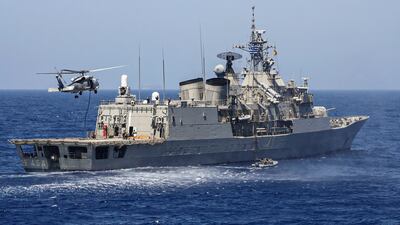The US State Department on Friday notified Congress that it has approved a $9.4 billion sale to upgrade the Greek navy amid ongoing tension with Nato ally Turkey in the Mediterranean.
The approval includes Greece’s $6.9bn purchase of four Lockheed Martin-manufactured, multi-mission surface combatant ships called “Hellenic Future Frigates".
The remaining $2.5bn component of the sale will go towards updating and enhancing four MEKO-class frigates that Greece already possesses.
Greece awarded the contract to the US after courting international offers to modernise its navy.
“The proposed sale will improve Greece’s capability to meet current and future threats by providing an effective combatant deterrent capability to protect maritime interests and infrastructure in support of its strategic location on Nato's southern flank,” the State Department said in a statement.
Although the State Department said the sale “will not alter the basic military balance in the region”, it comes as Washington seeks a detente with Greece’s Mediterranean rival, Turkey.
Greece has shadowed Turkish warships in recent years as Turkey sought to use its occupation of Cyprus to buttress its claims to contested maritime waters to explore and drill for natural gas.
The two countries sought to defuse the situation earlier this year when Greek Foreign Minister Nikos Dendias hosted his Turkish counterpart Mevlut Cavusoglu in Athens.
At the same time, Greece has sought to push back on Turkish drilling activity in the Mediterranean by pursuing energy co-operation projects with Cyprus and Israel.
Greece, Cyprus and Israel held their eighth trilateral meeting on energy exploration in Jerusalem this week.
Meanwhile, Turkey is pushing the US to update its fleet of F-16 fighter jets and Turkish President Recep Tayyip Erdogan raised the issue with US President Joe Biden when they met in October.
Washington expelled Turkey from the F-35 fighter jet co-production programme after Ankara moved ahead with its purchase of the Russian S-400 missile defence system over concerns that its radar system could be used to spy on the top-of-the-line warplanes.


